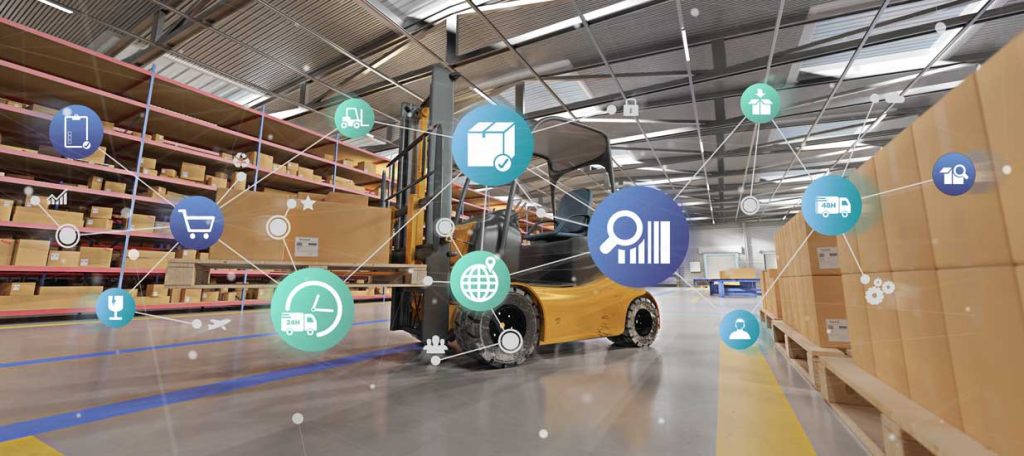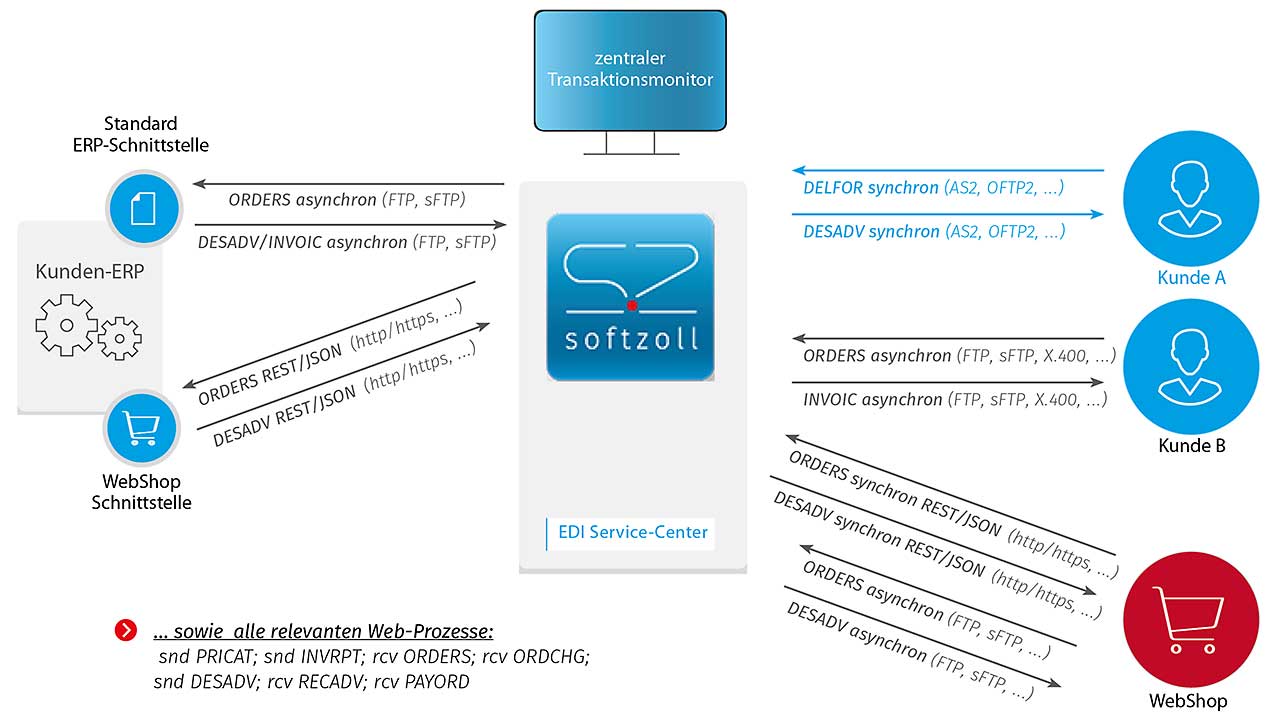ONLINE STORE INTEGRATION MADE EASY—WITH SOFTZOLL

The main function of online ordering platforms is generating orders.
The order data must be processed to trigger the downstream operations.
To ensure the integral processing of order data in the ERP system, the data generated via internet access must be integrated into the central processing functionalities of the ERP system.
Easily connect an online store to your ERP system
The integration of online store components and functionalities into the central ERP system via an existing or new EDI system should always be part of the strategic considerations of any holistic and intelligent e-commerce positioning.
Varying XML formats—ASCII/TXT export
The online store interfaces are often provided in varying XML formats; there is often the option of a simple ASCII/TXT export.With this simplest type of online store integration, the order data to be exported automatically in any format are simply stored in a file system with the possibility to access or dispatch then by means of an internal data communication tool, and fed via a suitable data channel (e.g., FTP/sFTP, http/https) to a stored processing routine of the central EDI subsystem. This ensures that the data generated via the online store is automatically transferred to the global interface “Inbound orders” of the ERP system.
Advantages for users
ONE format and partner-independent interface
In contrast to other providers, Softzoll provides one format and partner-independent process interface for each business process; it therefore makes sense to also transfer the order data generated via the online store to the central ORDERS IN and thus automatically to the ERP system’s order data processing, as well as to transfer the delivery-relevant details to the online store via the global DESADV OUT process interface. Therefore, these variants are still the most common method of online store integration:
Extensive information and control capabilities: Softzoll’s central transaction monitor
Click on the graphic to enlarge it
In addition to the obvious advantages of global process integration via a standardized interface, uniform central monitoring in particular plays a decisive role in our users’ strategic considerations. Even customers who create a dedicated integration interface for the online store’s ordering information for processing reasons do not have these data records transferred directly to the ERP system. To ensure capture by Softzoll’s central EDI transaction monitor, this data is routed to the Softzoll EDI system (see graphic). The EDI subsystem receives the order data generated via the online store, processes them further, and transfers them to the global “Inbound orders” interface of the ERP. This processing logic also applies to all other processes implemented in the online store and their corresponding interfaces in the EDI system.
Synergy effects through manufacturer-specific archiving workflows
The standardized transaction and monitoring hub not only records the data of customers and suppliers connected via classic EDI but also acts as a global process monitor, orchestrating and integrating all digitally transported process data. Together with long-term archiving connected to the central transaction monitor, this results in a holistic digitization strategy that counteracts heterogenization of the internal IT landscape through stand-alone applications. The holistic monitoring generates significant synergy effects for users and can be expanded into a closed loop of digital data management by subsequent dedicated and manufacturer-specific archiving workflows (e.g., via the COLD interface), indexed right through to the central archiving systems of the companies.
Timely mapping of defined information requests
The predominant variant of online store integration to date serves a manageable number of components; ultimately, however, in most cases the order data generated via the ordering platform are merely fed into the processing routines of an EDI system in different formats via an asynchronous transfer protocol (usually FTP/sFTP) for further processing. Modern online store modules offer users better display options for the wealth of information that can no longer be depicted with these outdated technologies (e.g., on-demand display of availabilities, etc.).
In order to map these and other promptly defined information requirements, a proprietary connection of the online module to the ERP system is often established (e.g., access of the online store to DB tables of the ERP system via a database gateway). In the past, some ERP systems, such as SAP’s BAPI technology, have also provided special interface modules for these and similar requirements.
Globally usable interfaces for synchronous and asynchronous process integration
The steadily growing functionality of online ordering modules is no longer just focusing on the ordering process as a central component of integration requirements; the data stream directed in the other direction from the ERP system to the online store is also becoming increasingly important in the catalog of requirements. As the processes required to supply and connect an online store increase, so does the challenge of no longer mapping these integrative aspects through costly proprietary interfaces and projects requiring many man-days. Globally usable interfaces are needed that enable both synchronous and asynchronous process integrations.
Requirements of a modern EDI system with respect to online store integration
A modern EDI subsystem with a promising long-term future combines both worlds. It is flexibly adapted to the ERP system in order to allow the ERP system to realize all requirements of a heterogeneous integration spectrum homogenized via a standardized interface technology. The change from purely file-based interfaces based on ASCII/TXT or XML paired with asynchronous protocols such as FTP/sFTP to synchronous integration options using REST or JSON based on http/https, which is at least planned for many ERP systems, offers new options for transaction control and traceability for modern EDI systems.
ALL FUNCTIONALITIES OF YOUR ONLINE STORE—INTEGRATED WITH SOFTZOLL

Current projects show that many ERP manufacturers are replacing the asynchronous interface technologies used previously with modern synchronous connection variants. For a multidimensional EDI system, this results in the option of not only handling conventional EDI transfers, but also acting as a mediator between synchronous and asynchronous integration requirements. In practice, this is currently found, for example, in the (DESADV) delivery notification process: here, the online store communicates real delivery deadlines to the online customer via the global DESADV OUT interface of the merchandise management system. The process integrity and competence of the ERP system are transferred to a standardized interface on the EDI data exchange level.
In addition, from a practical point of view, there are a large number of possible effective process integrations, all of which are already productive in existing scenarios today:
The choice of the exchanged file format (XML, ASCII, REST/JSON) plays a subordinate role here. More decisive is whether the data integration should be asynchronous (e.g., XML, ASCII via FTP/sFTP, e-mail, or similar) or synchronous (e.g., REST/JSON formats or DB integration via http/https).
Softzoll supports all variants and ensures uniform monitoring of all transactions processed via EDI and the online store in real time via the central transaction monitor.
More permeability between individual systems
Softzoll—your partner for a successful IT strategy
Due to the increase in digital data transfer observed in all segments, homogeneous process flows and intelligent higher-level strategies and process chains are now becoming a decisive building block of an IT strategy that is successful both internally and externally—and not just for large corporations. Even small and medium-sized enterprises are increasingly challenged to create scenarios that meet the requirements of modern digital document exchange. Softzoll is your reliable partner whose goal is to help all participants in the diverse value chains to participate on an equal footing, and within budget, in the increasing demands of digitalized business relationships.
This post is also available in DE.




